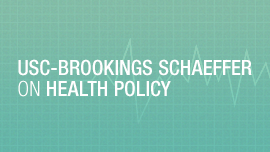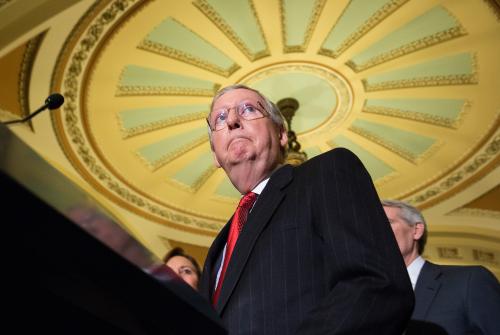This analysis is part of USC-Brookings Schaeffer Initiative on Health Policy, which is a partnership between the Center for Health Policy at Brookings and the University of Southern California Schaeffer Center for Health Policy & Economics. The Initiative aims to inform the national health care debate with rigorous, evidence-based analysis leading to practical recommendations using the collaborative strengths of USC and Brookings.
On June 22, Senate Republicans released a first draft of their health reform bill, the Better Care Reconciliation Act of 2017 (BCRA). The draft included substantial changes to state innovation waivers, which are included in section 1332 of the Affordable Care Act (ACA). As other authors and I noted at the time, the June 22 draft would have eliminated several of the substantive and procedural safeguards built into section 1332. As a result, a waiver that decimated coverage and misappropriated federal health care dollars to pay for other state priorities could be approved – indeed, must be approved – and then could not be revoked.
On July 13 and 20, Senate Republicans released two updated drafts of BCRA. These drafts include a revised version of the section 1332 amendments that appears intended to address the concerns raised about the original draft. Unfortunately, the changes in the new drafts do not fix the problems with the first draft. As a result, passage of the newer drafts would still open the door to waivers that undermine coverage and misuse federal health care funds. And as with the earlier draft, such waivers could not be denied by the federal government or revoked if harmful effects became clear.
Section 1332 under Current Law
Section 1332 provides broad flexibility for states to eliminate or modify many of the ACA’s central coverage provisions, including the health insurance Marketplace and related subsidies, the individual and employer mandates, and the definition of essential health benefits. If a waiver results in a reduction of federal subsidies flowing to the state, the state can receive the difference in “pass-through funding” to implement the state’s own plan for providing coverage.
Section 1332 balances this flexibility with substantive and procedural safeguards to prevent a waiver from harming individuals’ coverage or increasing federal deficits. The substantive safeguards, often referred to as “guardrails,” require that a waiver will not:
- Reduce the number of people with health coverage;
- Reduce the affordability of health coverage;
- Reduce the comprehensiveness of health coverage; or
- Increase the federal deficit.
Section 1332 also includes several procedural safeguards. Before a state can apply for a waiver, it must pass legislation enacting the state’s plan to provide coverage under the waiver – an assurance of broad support within the state. The Secretary of Health and Human Services and Secretary of the Treasury jointly approve or deny waivers, and they have discretion to deny a waiver even if they find that it satisfies the guardrails. A waiver may be approved for no more than five years (with the possibility of renewal), and it may be revoked if the Secretaries determine that it is not satisfying the requirements – for example, that it is costing more than expected and increasing federal deficits.
Together, these safeguards ensure that the broad flexibility available under waivers does not come at the cost of health coverage, federal budget discipline, and program integrity.
Concerns about the original Draft
As explained in greater detail in my previous analysis, the June 22 draft would upset section 1332’s careful balance by weakening its substantive and procedural safeguards. Most significantly, it would:
- Eliminate the three guardrails requiring that a waiver not adversely impact health coverage;
- Eliminate the Secretaries’ discretion to reject a waiver for other reasons;
In place of the coverage guardrails, the draft amends section 1332(a)(1)(B)(i) to require that the application include a “description” of how the state plan under the waiver would “provide for alternative means of, and requirements for, increasing access to comprehensive coverage, reducing average premiums, and increasing enrollment.” However, the legislation permits no inquiry into the impact of these alternative measures or even the plausibility of the description. Approval of the waiver depends only on deficit neutrality, and the Secretaries “shall” approve the waiver “unless” it fails that test. Even a waiver with a pro forma or ridiculous “description” must be approved. Indeed, the command to approve a waiver that satisfies deficit neutrality is so clear and emphatic that even a waiver that omitted the required description might be required to be approved.
Together, these changes would open the door to waivers with serious negative effects. In particular, the draft would permit:
- Waivers that would increase the ranks of the uninsured and make health coverage less affordable and less comprehensive;
- Waivers of important protections like the essential health benefits and the limits on enrollees’ out-of-pocket costs, harming individuals with costly health care needs, potentially nationwide due to cross-state effects.
- Waivers that divert federal health care dollars to other uses like state tax cuts, deficit reduction, or other programs.
Together, these changes would open the door to waivers with serious negative effects.
Magnifying these concerns, the draft would also:
- Forbid waiver revocation, even if it ends up increasing deficits or causing other problems;
- Extend the maximum waiver period to eight years;
- Permit states to apply for a waiver without enacting authorizing legislation; and
- Create a $2 billion fund to incentivize states to apply for waivers.
Putting all of this together, waivers could be enacted without state legislative action, could not be rejected even if they hurt health coverage or wasted taxpayer dollars, and then could not be revoked for eight years, even if it quickly became clear that they were harmful or wasteful.
The Current Draft doesn’t solve the problem
The July 13 and July 20 drafts include revised section 1332 language that appears intended to address the concerns described above.
- It tweaks the language in section 1332(a)(1)(B)(i) that requires states’ waiver applications to include a “description” of how the alternative policies included in a state’s waiver plan would support various health care goals. This new language includes adding “providing consumers the freedom to purchase the health insurance of their choice” to the list health care goals states should consider.
- More substantially, it adds a second reason, beyond failing deficit neutrality, that the Secretaries may deny a waiver: A waiver may also be denied if required elements of the application are “missing,” including the required description provided for in section 1332(a)(1)(B)(i).
The draft is otherwise generally the same: It eliminates the coverage-related guardrails, eliminates the Secretaries’ discretion to deny a waiver, provides that such a waiver may not be revoked, and extends the waiver period to eight years.
The addition of the second condition for waiver approval seems aimed at addressing concerns that the BCRA’s replacement for the Section 1332 guardrails—that states provide a “description” of “alternative means” for achieving various health care goals—is useless, since it has no impact on waiver approval. And indeed, it would seem to keep the Secretaries from approving a waiver that omitted the description entirely. But it would not address the more likely problem of the description being overly optimistic or far-fetched. As a result, even in a waiver described a wholly inadequate set of policies for maintaining coverage, the Secretaries would have no choice but to approve that waiver. Indeed, the administration would have no reason to even analyze the waiver’s impact on coverage since a denial would be possible only if the description was simply missing.
As a result, all of the deeply flawed waivers that could (indeed must) be approved under the earlier draft would still be approved under the new draft. For example, a state could waive the premium tax credit and repurpose those funds to an ineffective and wasteful health care program. A state could enact cuts to state public health programs and then apply for a waiver that used federal subsidy dollars to pay for those programs–effectively syphoning off federal dollars into the state budget. A state could even use pass-through funding for non-health purpose like housing or tax cuts, so long as the application included some justification–however far-fetched–for how the program contributed to coverage and affordability.
Conclusion
The Senate bill continues to evolve as various stakeholders weigh in. It is a hopeful sign that the section 1332 language was modified in response to important concerns. But the changes were not sufficient. The language in the most recent drafts would still loosen waiver rules so much that states could use federal taxpayers’ money to subvert the goals of health reform.
Jason A. Levitis is a Senior Fellow at the Yale Law School’s Solomon Center for Health Law and Policy. Until January of 2017, he led ACA implementation at the U.S. Treasury Department. In that capacity, he co-chaired an interagency work group charged with implementing the state innovation waiver program.
The authors did not receive financial support from any firm or person for this article or from any firm or person with a financial or political interest in this article. They are currently not an officer, director, or board member of any organization with an interest in this article.
The Brookings Institution is committed to quality, independence, and impact.
We are supported by a diverse array of funders. In line with our values and policies, each Brookings publication represents the sole views of its author(s).







Commentary
Revised Senate health care bill doesn’t fix concerns about state innovation waivers
July 25, 2017